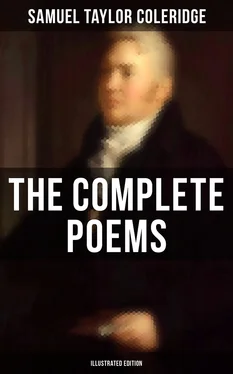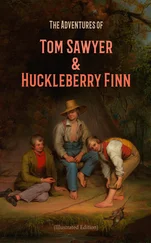Feb. 3, 1805
The gentlest form of Death, a Sylphid Death, passed by, beheld a sleeping baby—became, Narcissus-like, enamoured of its own self in the sweet counterfeit, seized it and carried it off as a mirror close by the green Paradise—but the reviving air awakened the babe, and 'twas death that died at the sudden loss.
THE FRENCH LANGUAGE AND POETRY Feb. 4, 1805
I cannot admit that any language can be unfit for poetry, or that there is any language in which a divinely inspired architect may not sustain the lofty edifice of verse on its two pillars of sublimity and pathos. Yet I have heard Frenchmen, nay, even Englishmen, assert that of the German, which contains perhaps an hundred passages equal to the—
Und ein Gott ist, ein heiliger Wille lebt,
Wie auch der menschliche wanke;—
and I have heard both German and Englishmen (and these, too, men of true feeling and genius, and so many of them that such company of my betters makes me not ashamed to the having myself been guilty of this injustice) assert that the French language is insusceptible of poetry in its higher and purer sense, of poetry which excites emotion not merely creates amusement, which demands continuous admiration, not regular recurrence of conscious surprise, and the effect of which is love and joy. Unfortunately the manners, religion and government of France, and the circumstances of its emergence from the polyarchy of feudal barony, have given a bad taste to the Parisians—so bad a one as doubtless to have mildewed many an opening blossom. I cannot say that I know and can name any one French writer that can be placed among the greater poets, but when I read the inscription over the Chartreuse—
C'est ici que la Mort et la Verité
Elevent leurs flambeaux terribles;
C'est de cette demeure au monde inaccessible
Que l'on passe à l'Eternité
I seem to feel that if France had been for ages a Protestant nation, and a Milton had been born in it, the French language would not have precluded the production of a "Paradise Lost," though it might, perhaps, that of a Hamlet or a Lear.
THE ABSTRACT SELF On Friday night, Feb. 8, 1805
On Friday Night, 8th Feb. 1805, my feeling, in sleep, of exceeding great love for my infant, seen by me in the dream!—yet so as it might be Sara, Derwent, or Berkley, and still it was an individual babe and mine.
"All look or likeness caught from earth,
All accident of kin or birth,
Had pass'd away. There seem'd no trace
Of aught upon her brighten'd face,
Upraised beneath the rifted stone,
Save of one spirit all her own;
She, she herself, and only she,
Shone through her body visibly."
Poetical Works , 1893, p. 172.
This abstract self is, indeed, in its nature a Universal personified, as Life, Soul, Spirit, etc. Will not this prove it to be a deeper feeling, and of such intimate affinity with ideas, so as to modify them and become one with them; whereas the appetites and the feelings of revenge and anger co-exist with the ideas, not combine with them, and alter the apparent effect of this form, not the forms themselves? Certain modifications of fear seem to approach nearest to this love-sense in its manner of acting.
Those whispers just as you have fallen asleep—what are they, and whence?
LITERA SCRIPTA MANET Monday, Feb 11, 1805
I must own to a superstitious dread of the destruction of paper worthy of a Mahometan. But I am also ashamed to confess to myself what pulling back of heart I feel whenever I wish to light a candle or kindle a fire with a Hospital or Harbour Report, and what a cumulus lies on my table, I not able to conjecture of what use they can ever be, and yet trembling lest what I then destroyed might be of some use in the way of knowledge. This seems to be the excess of a good feeling, but it is ridiculous.
COWPER'S "LINES TO MRS. UNWIN"
It is not without a certain sense of self-reproof, as well as self-distrust, that I ask, or, rather, that my understanding suggests to me the query, whether this divine poem (in so original a strain of thought and feeling honourable to human nature) would not have been more perfect if the third, fourth, and fifth stanzas had been omitted, and the tenth and eleventh transposed so as to stand as the third and fourth. It is not, perhaps not at all, but, certainly, not principally that I feel any meanness in the "needles;" but, not to mention that the words "once a shining store" is a speck in the diamond (in a less dear poem I might, perhaps, have called it more harshly a rhyme-botch ), and that the word "restless" is rather too strong an impersonation for the serious tone, the real ness of the poem, and seems to tread too closely on the mock-heroic; but that it seems not true to poetic feeling to introduce the affecting circumstance of dimness of sight from decay of nature on an occasion so remote from the το καθολου, and that the fifth stanza, graceful and even affecting as the spirit of the playfulness is or would be, at least, in a poem having less depth of feeling, breaks in painfully here—the age and afflicting infirmities both of the writer and his subject seem abhorrent from such trifling of—scarcely fancy, for I fear, if it were analysed, that the whole effect would be found to depend on phrases hackneyed, and taken from the alms-house of the Muses. The test would be this: read the poem to a well-educated but natural woman, an unaffected, gentle being, endued with sense and sensibility—substituting the tenth and eleventh stanzas for those three, and some days after shew her the poem as it now stands. I seem to be sure that she would be shocked—an alien would have intruded himself, and be found sitting in a circle of dear friends whom she expected to have found all to themselves .
ETYMOLOGY
To say that etymology is a science—is to use this word in its laxest and improper sense. But our language, except, at least, in poetry, has dropped the word "lore"—the lehre of the Germans, the logos of the Greek. Either we should have retained the word and ventured on Root-lore , verse-lore , etc., or have adopted the Greek as a single word as well as a word in combination. All novelties appear or are rather felt as ridiculous in language; but, if it had been once adopted, it would have been no stranger to have said that etymo logy is a logy which perishes from a plethora of probability, than that the art of war is an art apparently for the destruction and subjugation of particular states, but really for the lessening of bloodshed and the preservation of the liberties of mankind. Art and Science are both too much appropriated—our language wants terms of comprehensive generality, implying the kind, not the degree or species, as in that good and necessary word sensuous , which we have likewise dropped, opposed to sensual, sensitive, sensible, etc., etc. Chymistry has felt this difficulty, and found the necessity of having one word for the supposed cause, another for the effect, as in caloric or calorific, opposed to heat; and psychology has still more need of the reformation.
SENTIMENT, AN ANTIDOTE TO CASUISTRY
The Queen-bee in the hive of Popish Error, the great mother of the swarm, seems to me their tenet concerning Faith and Works, placing the former wholly in the rectitude, nay, in the rightness of intellectual conviction, and the latter in the definite and, most often, the material action, and, consequently, the assertion of the dividuous nature and self-existence of works. Hence the doctrine of damnation out of the Church of Rome—of the one visible Church—of the absolute efficiency in se of all the Sacraments and the absolute merit of ceremonial observances. Consider the incalculable advantage of chiefly dwelling on the virtues of the heart, of habits of feeling and harmonious action, the music of the adjusted string at the impulse of the breeze, and, on the other hand, the evils of books concerning particular actions, minute cases of conscience, hair-splitting directions and decisions, O how illustrated by the detestable character of most of the Roman Catholic casuists! No actions should be distinctly described but such as manifestly tend to awaken the heart to efficient feeling, whether of fear or of love—actions that, falling back on the fountain, keep it full, or clear out the mud from its pipes, and make it play in its abundance, shining in that purity in which, at once, the purity and the light is each the cause of the other, the light purifying, and the purified receiving and reflecting the light, sending it off to others; not, like the polished mirror, by reflection from itself, but by transmission through itself.
Читать дальше












